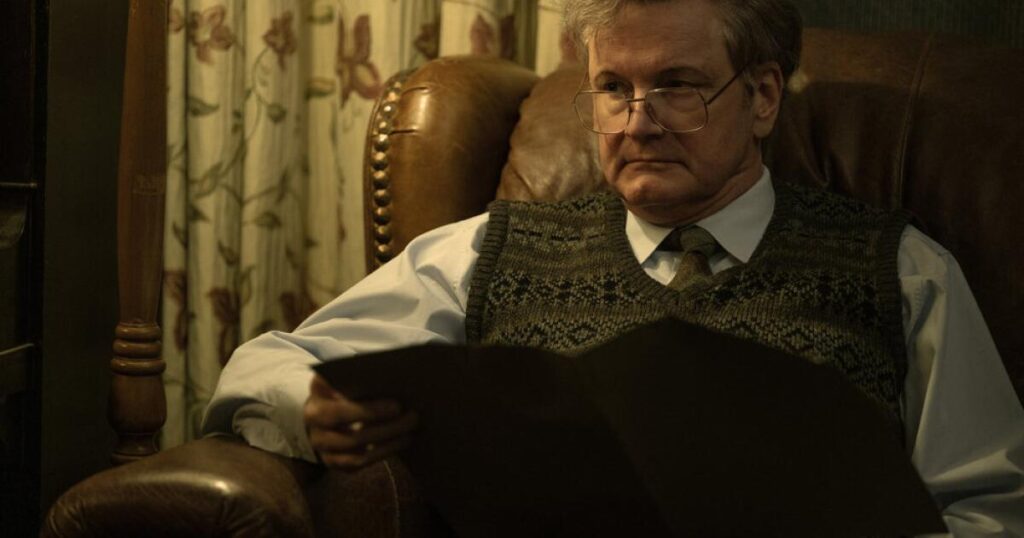[ad_1]
On Dec. 21, 1988, a bomb exploded on Pan Am Flight 103 over Lockerbie, Scotland, traveling from London to New York, breaking it apart and sending it to Earth. Flora Swire, a 23-year-old Englishwoman, was among the 270 killed (including 11 on the ground). Her father, physician Jim Swire, became a spokesperson for families pressing for an investigation and later an advocate for investigating the investigation. In 2021, he published a book, co-written with Peter Biddulph, “The Lockerbie Bombing: A Father’s Search for Justice,” which has now become a five-part Peacock miniseries, the less personally titled “Lockerbie: A Search for Truth,” in which he is played by Colin Firth.
That search has gone on for more than 30 years, in fits and starts, with imperfect resolution, but apart from the question of whether Swire has used his time well — which his screen double will have cause to question — there is the less complicated question of whether a five-hour miniseries can support a viewer’s interest in his quest.
The first episode, in which the Swire family sends Flora (Rosanna Adams) off to her fatal flight, is heart-stopping, first because we know what’s coming and second because the crash, as experienced from the ground, as the plane comes down in pieces, is well-realized and terrifying. So is the drama of panicked parents searching for information — which is maddeningly slow in coming — and then for bodies. But before long, we are confronted with a long parade of expository scenes in which Swire and an interested journalist (Sam Troughton) trade not always good, usually secondhand information; indeed, apart from Swire’s emotion-heavy, information-light scenes with his wife, Jane (Catherine McCormack), much of the rest of the series consists of characters catching one another up on the news. Although Swire will do a good bit of traveling — to Scotland and the U.S., to Libya, where he will twice meet Moammar Kadafi (Nabil Al Raee), and the Netherlands, where a trial will eventually take place — there is very little in the latter four episodes that could be described as action.
As a story of the wheels of justice, or injustice, grinding slowly, it does grind slowly. Time marches on, decades passing as actors age with new hair and makeup, through 9/11 and the war on terror, to Wikileaks and the war on secrecy. Contemporary news clips make one want to find a documentary on the subject — of which there have been many, including the 2023 BAFTA-winning docuseries “Lockerbie,” in which Swire also figures — or “read further,” as the phrase goes. (Another Lockerbie docudrama, should you care to continue down this road, is coming from Netflix later this year.) Like many historical dramas based on a participant’s point of view, it shapes itself to his theory of the case, with controversial situations and characters presented accordingly. You are set up to buy Swire’s version, as it evolves, however many other people don’t.
By the same token “A Search for Truth” never becomes the conspiracy thriller it suggests lurks beneath the public record, restricted as it is by history. It has possibilities as the story of an unlikely relationship, between Swire and accused bomber Abdelbaset al-Megrahi (Ardalan Esmaili), but as a domestic drama, it’s one-note — or rather two-note, as Jane alternates between exasperation and support. The series pays no more attention to Swire’s family than he seems to.
Firth is onscreen throughout, but because the story is fragmented, jumping ahead for years at a time, he lacks the space to create a full-blown character. (Others fare even less well.) Except for the beginning, before the bombing, and the very end, when a little enlightenment breaks in — a person he cares about having observed that death lasts a long time but life is for living — Firth is stuck acting modes of depression and agitation, which, however true to Swire’s lived experience, becomes repetitious, tedious. Even his grief is smothered by his monomaniacal need for closure: “This is not about revenge,” he will tell Kadafi, pinning a campaign button on his lapel. “The truth must be known.” You may be less sure.
[ad_2]
Source link

